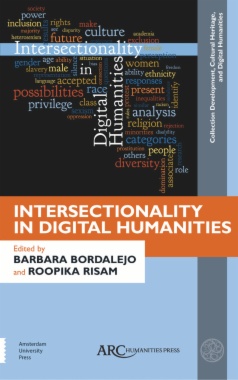CURRENTLY UNAVAILABLE
Coined by Kimberlé Crenshaw in the late 1980s, intersectionality makes the case that dimensions of identity, such as gender and race, cannot be understood in isolation from each other because they work together to shape lived experience. As digital humanities has expanded in scope and content, questions of how to negotiate the overlapping influences of race, class, gender, sexuality, nation, and other dimensions that shape data, archives, and methodologies have come to the fore. Taking up these concerns, the authors in this volume explore their effects on the methodological, political, and ethical practices of digital humanities. Essays examine intersectionality from a range of positions: the influence of overlapping identities on scholars within the digital humanities community; how the fields in which they work are subject to competing tensions created by intersecting power structures within digital humanities and academia; and the methodological possibilities and scholarly potential for intersectionality as a framing theory in digital humanities scholarship.
- Cover
- Half-title
- Series Information
- Title page
- Dedication
- Copyright information
- Table of contents
- Illustrations
- Acknowledgements
- Introduction
- Chapter 1. All the Digital Humanists Are White, All the Nerds Are Men, but Some of Us Are Brave
- Chapter 2. Beyond the Margins
- Introduction
- The Lessons of Theory
- Toward an Intersectional Digital Humanities
- Conclusion
- Chapter 3. You Build the Roads, We Are the Intersections
- Choosing Leaders
- Intelligence and Personality Traits
- Deconstruction
- Chapter 4. Digital Humanities, Intersectionality, and the Ethics of Harm
- Digital Humanities and Ethics of Harm
- Digital Data, IRB, Academic Research, and Intersectionality
- Case 1: Portland State University and the Portland Public Schools
- Case 2: Facebook, Cambridge Analytica, Mercers, and the Weaponization of Intersectionality
- Chapter 5. Walking Alone Online
- Background
- The Importance of Gamergate
- Zoe Quinn and Depression Quest
- Being Online
- The Day I Asked Questions
- The Trolls
- Why Do They Do It?
- Trolling Celebrities on Social Media
- The Violence Affecting Us
- Conclusions
- Chapter 6. Ready Player Two
- Introduction
- Definitions and Privilege
- Gamergate
- “MikeeUSA”: Feminism, Bigotry, and Freedom of Speech in the Hacker Community
- Rise of the “Brogrammer”
- Conclusion: Change Is Happening
- Chapter 7. Gender, Feminism, Textual Scholarship, and Digital Humanities
- Chapter 8. Faulty, Clumsy, Negligible?
- Women Letter-Writing Under Men’s Criticism
- Early Modern Concepts of Women’s Education
- A Digital Annotated Corpus of Women’s Correspondence
- Gender-Specific Language Use: Some Analysis Examples
- Chapter 9. Intersectionality in Digital Archives
- Situating the Author
- Introduction
- At the Intersection: The Digital Archive as a Model of an Archives
- Marginalized Voices in the Archives and the Digital Turn
- Intersectionality as a Digital Humanities Approach for Archival Silences
- Case Study: Processing and Digitizing the Barbados Synagogue Restoration Project Records
- Intersectional Identities in BSRP
- Intersectionality of the Synagogue Historic District: Communities Inhabiting the Place
- Analysis
- Mapping Out Intersecting Lives
- Beyond Documents: “Unearthing” Intersecting Stories
- Intentionality: Overcoming Archival Silences in Marginalized Populations
- “Reading” the BSRP Digital Archive
- Discussion and Recommendations
- Map Out Intersecting Lives in Advance
- Go beyond Documents
- Seek Community
- Be Intentional When Pursuing Intersectionality
- “Read” the Digital as One Part of the Story
- Conclusion
- Chapter 10. Accessioning Digital Content and the Unwitting Move toward Intersectionality in the Archive
- Introduction
- A Note on Terminology
- Intersectionality and the Archive
- Identity
- Power
- Marginalization
- The Community Archive
- Case Studies
- Accessions and the Digital
- Intersectionality
- Conclusions
- Chapter 11. All along the Watchtower
- The Bonfire of the (Digital) Humanities
- Full of Sound and Fury …?
- Medieval Studies: A Counter Case
- Content vs. Method in Historical Disciplines
- Digital Humanities as Methodological Science
- The Role of Diversity
- Diversity and Quality
- Diversity Instead of Quality
- Conclusion
- Select Bibliography
- Index

